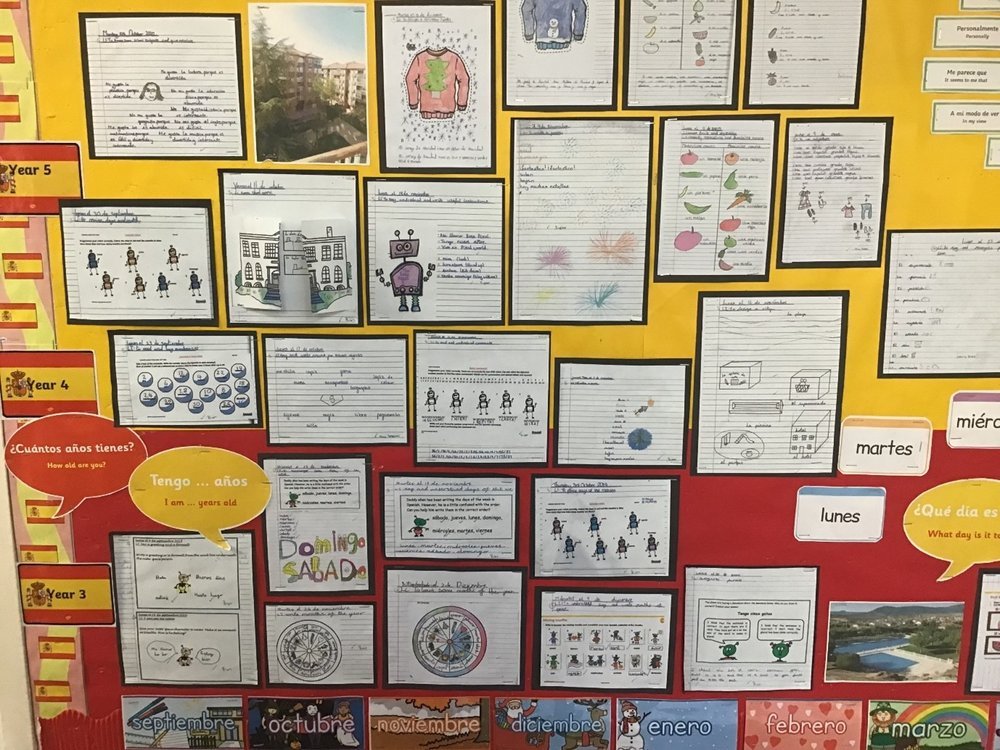Languages on display
Insights from a Primary MFL Consultant
I’m Kate Percival, a primary teacher and MFL consultant here at Primary Languages Network. In this blog series, I’ll be sharing top tips and inspirational ideas from the schools and coordinators I’ve been working with. Read on to find out more.
Passionate about languages
Michael Drayton Junior School have been longstanding members of Primary Languages Network and it was a pleasure to catch up with their MFL coordinator Steve Eardley for a PLN one-to-one consultancy session.
Steve is pleased with the way both the Premium Plus and Click2Teach Schemes of Work are working in parallel at his school. Steve has responsibility for teaching the Spanish throughout the 5-form junior school and so makes less use of the video lessons himself as he feels supported to deliver using the Click2Teach PowerPoints and resources. The beauty is that when other members of staff cover language lessons, the Premium Plus video lessons become an invaluable tool, especially for non-specialists.
We discussed that in his role, it is important that the class teachers themselves are aware of where the children are at in their learning. This can be a quick in-person chat or email each week and, what’s nice is, this is where you can pass on a little 5-minute recall task for the children to practise before their next session. We talked about maybe nominating a couple of Language Ambassadors in each class whose job is (amongst others) making sure that the task - which could be a short game or song - is slotted into the school day for that all-important recall practice.
Book work
We discussed written work and Steve explained that the children’s Spanish workbooks follow them up through the school from Y3 to Y6. This is a great way of demonstrating progress in writing during the four years of KS2. Also, the children can use their books to retrieve language and learning from previous years which is what I think workbooks should be about. Steve agreed that the best way of ‘marking’ work is by discussing any errors or misconceptions either at the time or at the start of the following week. Steve was very proud that the culture of ‘it’s OK to make mistakes’ is firmly established in lessons which gives children permission to have a go and not to worry if it isn’t quite right. Also included in books were half termly Puzzle It Out assessments in all four skill areas (listening, speaking, reading and writing). Steve explained that he chooses to do the writing task slightly earlier - just after the children have covered the content - as it makes assessing more manageable and the children feel more confident that they can achieve. I love it when subject coordinator feel empowered to adapt PLN ideas to best suit their school and context – that shows real leadership.
Languages on display
Steve uses stickers for rewarding effort in lessons and for those showing language detective skills. PLN also has language detective certificates saved with every lesson which can be printed and awarded to children. A nice idea if you teach many children per week is to print and even laminate much smaller versions of the certificates so you have a stock ready to hand out. These make great bookmarks or can go home and be proudly displayed on the kitchen fridge or a bedroom wall, encouraging discussion at home about what the children have learnt in Spanish.
Whole-school display of writing in Spanish - Michael Drayton Junior School
Steve has managed to gain a regular slot in the school newsletter promoting a Spanish ‘Word of the Week’ (upskilling the school office staff at the same time!) Another spotlight on language comes on the ‘Star Board’ in school where a ‘Linguist of the week’ is proudly displayed with a mention in Year Group assembly too.
Steve has taken the idea of displaying children’s Spanish work to a new level and we are a real fan of this idea here at PLN: a whole-school year-long display of work which tracks progress and experience from Y3 to Y6. What a fantastic snapshot of language learning at the different stages of KS2!
Michael Drayton Junior School has recently been awarded the Primary Languages Development Award which is testament to Steve’s passion to drive Spanish forward in the school and fly the flag for his subject for all to see – congratulations Steve!
MFL consultancy sessions can run virtually or in person and can cover areas such as: starting out with primary languages in your school and putting together coordinator documentation, preparing for an MFL deep dive or looking for the next challenge. You will be given a full report of the discussion which includes working points and this can be shared with your Head teacher. Also included is a shorter catch-up session at an agreed future date where we can celebrate progress made and support with anything further.
If you would like to book Kate for a consultancy session, click the button below or contact sylvia@primarylanguages.network




